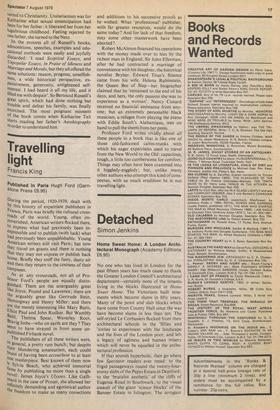Travelling light
Francis King Published in Paris Hugh Ford (Garnstone Press £6.95) buring the period, 1920-1939, dealt with by this history of expatriate publishers in France„ Paris was briefly the cultural crossroads of the world. Young, often imPoverished, American writers flocked there, to express what had previously been inexpressible and to publish (with luck) what had previously been unpublishable. Young American writers still visit Paris; but now they travel on grants and there is nothing that they may not express or publish back home. Briefly they sniff the fusty, dusty air and then they return to the cosiness of their Campuses.
As at any crossroads, not all of Professor Ford's people are equally distinguished. There are the unarguably great lIke Joyce, Pound and Lawrence; there are the arguably great like Gertrude Stein, Hemingway and Henry Miller; and there are the merely interesting like Mary Butts, Elliot Paul and John Rodker. But Wambly Raid, Thelma Spear, Waverley Root, Bravig Imbs—who on earth are they ? They seem to have strayed in from some unPublished Firbank novel.
The publishers of all these writers were, In general, a pretty rum bunch; but despite their blundering amateurism, each could b°ast of having been accoucheur to at least ne masterpiece. Best known of them now Sylvia Beach, who achieved immortal tame by publishing no more than a single novel: James Joyce's Ulysses. Like Gatlin). ard in the case of Proust, she allowed her infinitely demanding and egotistical author the freedom to make as many corrections
and additions to his successive proofs as he wished. What 'professional' publisher, with far greater resources, would do the same today ? And for lack of that freedom, may some other masterwork have been aborted ?
Robert McAlmon financed his operations with the money made over to him by the richest man in England, Sir John Ellerman, after he had contracted a marriage of convenience with his daughter, the historical novelist Bryher. Edward Titus's finance came from his wife, Helena Rubinstein, the Queen Bee of Slap—her biographer claimed that he 'remained to the end of his days, and hers, the only passion she was to experience as a woman'. Nancy Cunard received no financial assistance from anyone; but an extremely personable black musician, a refugee from playing the piano with Eddie South's Alabamians, was on hand to pull the sheets from her press.
Professor Ford writes vividly about all these people in a book that is like one of those old-fashioned cabin-trunks with which his eager expatriates used to travel from the New World to the Old: capacious, tough, a little too cumbersome for comfort. Things may often have been crammed into it higgledy-piggledy; but, unlike many other authors who attempt this kind of conspectus, with so much erudition he is not travelling light.


























 Previous page
Previous page